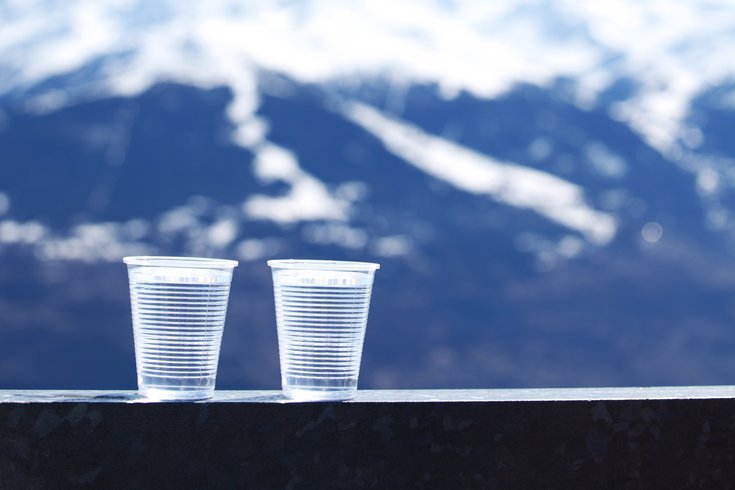
January 03, 2023
 Source/Image licensed from Ingram Image
Source/Image licensed from Ingram Image
People can become dehydrated during the cold, winter months, too, partly because they tend to feel less thirsty. But even small amounts of fluid loss can lead to fatigue.
People tend to place greater emphasis on staying hydrated during the summer, when the hot temperatures increase the risk of heat exhaustion and heat stroke. But dehydration is a real concern in the cold, winter months, too.
How much water do people really need? The National Academies of Sciences, Engineering and Medicine recommends six to nine 8-ounce cups of fluid per day for women and eight to 12 for men, but experts acknowledge that people's hydration needs are unique based on their activity levels and the environment outside.
According to the Centers for Disease Control and Prevention, the average American adult drinks more than five cups of water a day.
Most people will experience thirst when they are not drinking enough water to offset their body's use of it. Young children and older adults, however, often don't feel thirsty even when their water consumption is inadequate.
When people feel tired, irritable and foggy-headed during the winter months, they often chalk it up to hectic schedules, cold, dreary weather or seasonal affective disorder, but health experts say that fatigue may be due to dehydration. It is important to drink enough water all year long – not just in the summer.
Staying hydrated during the winter can be complicated by several factors. The first is that people tend to be less thirsty in cold weather, but even small amounts of fluid loss can make people feel more tired. According to a University of New Hampshire study, people feel up to 40% less thirst in cold weather even though the body's hydration requirements stay the same all year long.
Another factor is that dry heat, at home and at work, can sap energy levels and lead to dehydration. So can exposure to cold temperatures when people inhale and exhale cold air through their mouths.
Experts advise people to wear scarves over their mouths when they step outdoors in the winter time so that they are more likely to breathe through their noses. They also suggest adding moisture to the air in their homes by using humidifiers, hanging laundry inside or leaving bathroom doors open after showering.
Another simple way to boost hydration is to stir a quarter teaspoon of salt into a glass of water. Research shows that water with salt is more hydrating than plain water because the salt helps the body absorb and retain fluids.
Also, people who find that they aren't feeling thirsty throughout the day can stimulate the thirst mechanisms in their brains by eating a small amount of sugar, like a mint. Just a little bit of sweetness can leave people craving a glass of water.
People can optimize hydration this winter by carrying water with them wherever they go, wearing layers to reduce water loss caused by sweating and minimizing consumption of alcohol and caffeinated drinks. Drinking hot beverages, like green or cinnamon tea, and water-enriched fruits and vegetables are tasty ways to meet daily hydration goals.
Dehydration occurs when people use more fluids than they take in. When people don't adequately replace lost fluids, their bodies aren't capable of functioning properly. Anyone can become dehydrated, but those at most risk are young children and older adults, the Mayo Clinic says.
Children can become dehydrated when they have severe diarrhea or vomiting, and are unable to keep enough fluids down. Because older adults naturally have lower volumes of water in their bodies, certain conditions and medications put them at higher risk of dehydration. Excessive sweating from illness or exercise, and increased urination also can cause dehydration.
Symptoms of dehydration include extreme thirst, less frequent urination, dark-colored urine, fatigue, dizziness and confusion. Infants and children who are dehydrated may have a dry mouth or tongue, no tears when crying and no wet diapers for three hours, listlessness or irritability. They also may have sunken eyes, cheeks and the soft spot on the skull.
People can usually reverse mild-to-moderate dehydration by simply drinking more fluids, but severe cases need immediate medical treatment.
Besides heat exhaustion and other forms of heat illness, dehydration can increase joint pain, cause seizures and prompt low blood volume shock – when blood pressure and oxygen levels drop suddenly.
The American Heart Association reports that even minor dehydration can cause difficulties with concentration, memory and mood. Chronic dehydration can lead to diabetes, and urinary and kidney problems, such as urinary tract infections, kidney stones and, in extreme cases, kidney failure.
A recent study also suggests that poor hydration may increase the risk for early aging and chronic disease. Not all researchers agree with the findings though, according to NBC News. More data is needed to confirm them.
People who have had diarrhea for 24 hours or more, can't keep down fluids, have bloody or black stool or are disoriented and sleepier than usual are advised to seek medical attention.